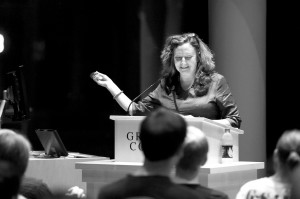Susanne Antonetta, a widely known writer in the field of environmental studies and a proponent of neurodiversity, held a reading on Thursday. Amongst other works, she is the author of “Body Toxic: An Environmental Memoir” which looks back on her upbringing in New Jersey and the chemical contaminants that impacted her body.

“Body Toxic” is subtitled an environmental memoir and I find it interesting, and also very appropriate that you would make so much space for your surroundings in your memoir— why did this feel necessary?
The way that book really began to form was in layers it really accreted. It started about a straight memoir of my family in Barbados. I had put out old notes about my family there. Then I pulled out my notes about when I went down there and met them, that is where I started. Then it turned into a story about my contemporary family, my extended family and then it just kept striking me how we were all struggling with the same health issues.
Clearly memoir has been excessively physiological and it has kind of turned out that we live in this much larger context, in which we are informed by the places we grew up in and the challenges. It was really just a matter of accreting all that. My cousins and I were dealing with the same type of problems—fertility problems—and at one point it occurred to me, at what point is your life non-physiological, but determined by all these other factors.
What drove you to intermingle personal experiences, specific events, and reflections in “A Mind Apart?”
I’m always interested in writing that looks at the bigger picture. It can be frustrating to read writing that is so small that it doesn’t seem to want to take up any space and at the end of the day you are just figuring out that someone likes toast or some type of furniture. I just think if I were that type of writer, I don’t think I would have the fortitude to sit down every day and write. For me there has to be something at stake, or I think: why bother? Maybe that’s a sign of laziness.
In “A Mind Apart” one of the main things I was trying to draw out was the whole process of evolution. We are in the position right now where we can map the human genome. We have sold it—it’s in private hands and you can start eliminating many types of people. Then we begin to ask ourselves what human culture is all about, why we’ve gone in the directions we’ve gone and maybe the big mistakes we’re on the verge of making.
Can you talk about your upcoming book, Inventing Family, and anything you are working on now?
It’s about the history of adoption going back to Hammurabi’s code and how different civilizations dealt with it around the world. For example, in Oceania—all the pacific islands—adoption is simply normal. It’s almost not normal if you stay with you biological parents your whole life. They move family around very freely.
I have an adopted child, who is a boy of color, and there is this feeling in the education community that male children of color are going to have behavior problems and it’s this thing I cope with all the time. I find myself having to go to teachers with research books telling them it’s not true.
I’m also working on a newer book, that’s very complicated, that has to do with the way the eugenic movement enabled the Holocaust to happen. They began by gassing mental patients and Hitler kind of looked at it as a template to follow. Right now it’s very overwhelming to see how much of this is going on way before Hitler. It’s a story that needs to be told.



















































